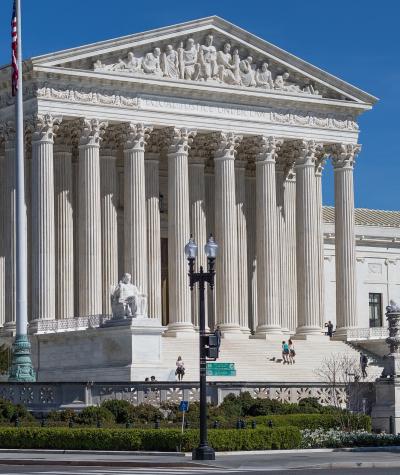Campaign Legal Center (CLC), Citizens for Responsibility and Ethics in Washington (CREW), Common Cause and League of Women Voters of California (LWV) submitted an amicus brief to the U.S. Supreme Court (SCOTUS) in Americans for Prosperity Foundation v. Becerra.
The brief urges the Court to uphold California’s law that requires charitable groups active in the state to file nonpublic tax reports – Schedule Bs – with the state Attorney General (AG) listing their largest donors.
The state has asserted that the law requiring nonpublic reports is necessary to effectively enforce its tax and nonprofit laws and prevent charitable fraud. In California, the Schedule B form is kept confidential and used only for governmental oversight purposes.
But the petitioners Americans for Prosperity Foundation (AFPF) and the Thomas More Law Center refused to submit their Schedule B donor reports to the AG’s office and brought this lawsuit against the California AG.
They claimed that the confidential submission of the Schedule B will violate their First Amendment rights by exposing the handful of major donors that appear on each group’s Schedule B form—many of whom contribute above a million dollars annually—to harassment and threats.
To support their claims, AFPF and the Law Center likened themselves and the potential harassment faced by their major donors to that of NAACP members during the civil rights movement in Alabama.
The petitioners are making this bold claim to urge the Court to either strike down California’s law as unconstitutional on its face or grant both groups an exemption from the reporting requirement—even though the state requirement is functionally identical to their nonpublic reporting obligations under federal tax laws, which the petitioners are not challenging.
In positioning their case at the Supreme Court, the petitioners explicitly disavow any intent to challenge public and electoral transparency laws.
Instead, they are asking the Court to ratchet up the standard of review applied in disclosure cases only when they involve nonpublic financial disclosures to government regulators—but a broad ruling accepting that theory could make it harder to defend all disclosure laws in court.
The petitioners are also claiming the unique exemption from disclosure laws that the Supreme Court created in Buckley v. Valeo to protect historically marginalized groups facing severe persecution and harassment.
Unlike the disclosure law in Buckley, however, California’s law requires confidential reporting, so there is no reasonable chance that petitioners’ major donors will be exposed to any public hostility.
By conflating their circumstances with those of marginalized groups, the petitioners threaten to expand the disclosure exemption, potentially putting other transparency measures at risk in the future, including disclosure of money spent on elections.
A case about the constitutionality of California’s confidential tax reporting law should not be permitted to dilute the Court’s well-established precedents endorsing voters’ right to know who is spending money to influence our elections and our government.
This case has nothing to do with elections or any claimed interests in public transparency. It should not be used as a vehicle to expand exemptions from transparency in election spending to any deep-pocketed, politically active group that attracts public criticism for messages to evade disclosure.
